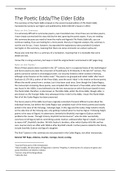Samenvatting
The Poetic Edda - Ful Summary
This document contains a summary of the entire The Poetic Edda translated by Carolyne Larrington. This includes: Seeress’ Prophecy (Voluspa), Sayings of the High One (Havamal), Vafthrudnir’s Sayings (Vafthrudnismal), Grimnir’s Sayings (Grimismal), Skirnir’s Journey, Harbard’s Song (...
[Meer zien]





